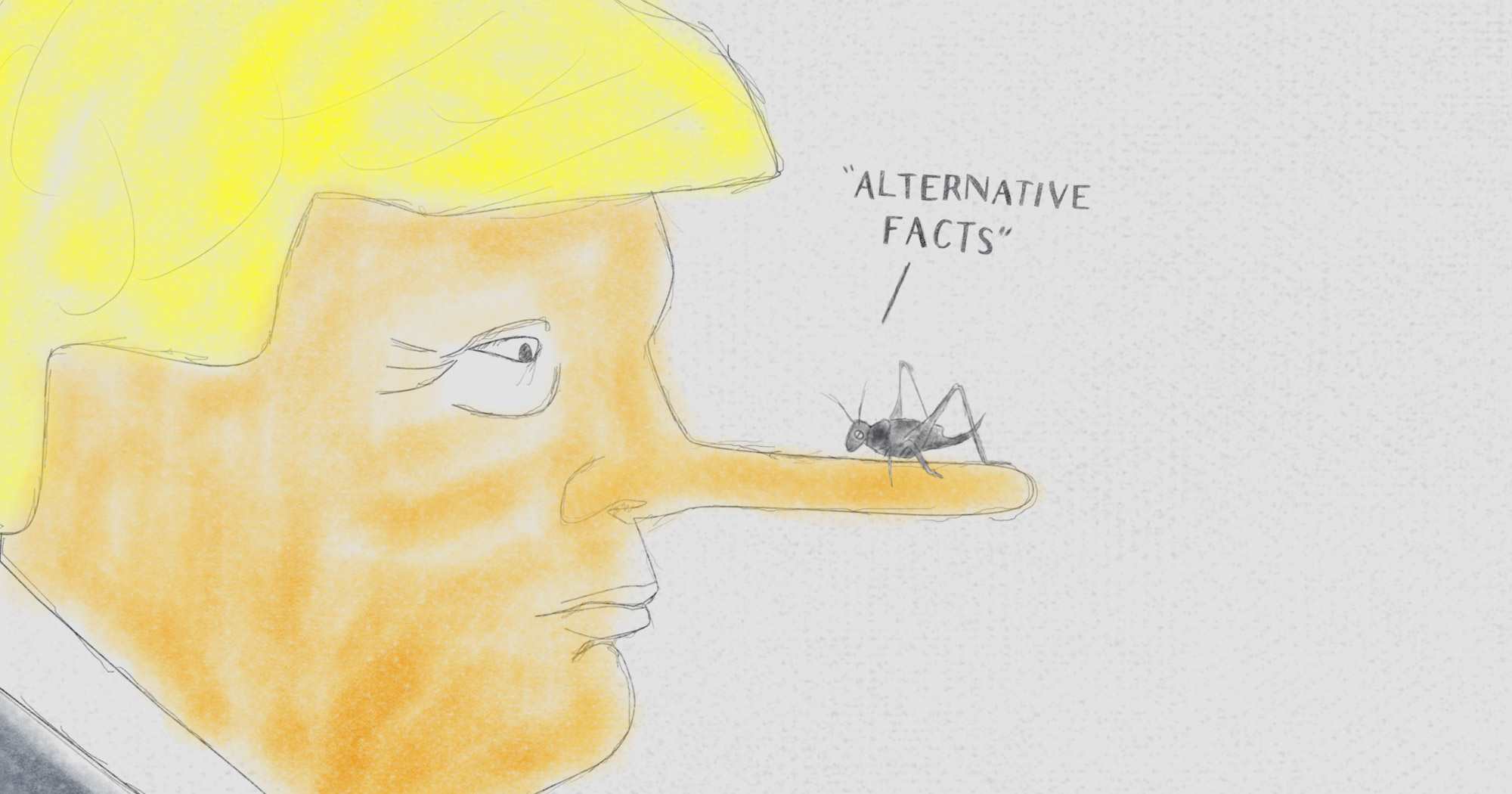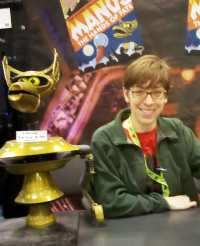Yes, Libraries Can Fight 'Alternative Facts' While Still Welcoming All Points of View

When the White House spokesperson claims the right to choose facts, purveyors of information need to take notice. Yes, even when the issue in question is as silly as the size of an inauguration crowd. As with private citizens, it’s the small details that reveal the character of a politician or political administration. It is time for libraries to plan for what we will inevitably have to deal with professionally over the next four years: the concept of “alternative facts.”
Accurate information hasn’t always been a given in American culture, but for the most part, pundits and talking heads have paid lip service. Kellyanne Conway’s statement, half dog-whistle to the alt-right, half belligerent media bait, may be the boldest admission yet that the new administration considers itself capable of steering the American mind through information control, and a symptom of institutional insecurity that will, sooner or later, manifest in a barrage of self-validating published work.
In this environment, any given fact is not necessarily wrong, materially or morally; it’s an alternative to a less convenient fact. It’s a choice, and therefore a belief. Belief has shown itself to be valuable coin over the past two years. Some people in this country believe that Obamacare is destroying them even as they rely on the ACA. Others believe that their interests are best represented by a cartoon frog that hates brown people. Both of these belief-choices represent the “alternative fact” in question weaponized against the very people who embrace it. The concept of a choice of truths furnishes the permission to be fatally uninformed that this administration needed to get into office. “Alternative” has become the cute media-ready label for the bad wolf of America’s soul.
The question with which we librarians are now faced is one that touches a deep identity anxiety: How far goes our responsibility to protect the public from state sponsorship of bad information?
Providers, not deciders
Libraries tend to live in the myth of the politics-free space, though anyone who’s ever had to actually build a library structure under the auspices of a municipality will know how thin this myth can be. Now, we have the problem of the mainstreaming of offensive content typified by Milo Yiannopoulos’s upcoming book, arguably politically repugnant due to the author’s hateful rhetoric and tendency to organize mass online bullying campaigns against his enemies. His point of view on paper has prompted a flurry of backlash, but of course public libraries will collect it, just as we’ll collect other politically charged and perhaps repugnant books, many of them full of “alternative truths,” over the next four years. We must, or we risk eroding the heart of our profession.
Librarians are not deciders, we’re providers, and we have always provided at least some information that is wrong. Both Michael Moore and Ann Coulter, bestsellers and perennially popular on their sides of the stacks, enjoy massaging the facts, but calling for the removal or noncollection of either would be unheard-of. The specter of censorship could highlight a rift between librarian and patron that recalls Foucault’s power politics, a skewed relationship between the person with the book-purchasing power and the person who must ask for a book.
This is exactly the time in our nation’s history when libraries cannot afford to lose hearts and minds. If any American institution can dig the country out of this post-truth mess, it will be the one that gives away books for free regardless of how it feels about their subject matter, regardless of who is “right.” If we begin curating in this way, someone will eventually call for a stop to it, and then we risk being forced, ungracefully and without preparation or plan, into overcompensation or political partisanship.
Though libraries have provided the public with options for wrong and biased information on everything from quack medicine to skewed American history, most at least flirt with a standard of quality. A library might stock fad diet books that hold up an impossible, even unhealthy physical goal, whose near-inevitable failure by the patron who takes them seriously may cause unnecessary pain to that person. But most libraries won’t seek out a pro-anorexia book for patrons interested in starving themselves. Mainstream publishers, of course, haven’t been willing to touch outlandishly harmful topics like that in the past, and the line seemed clear: Grey’s Anatomy is OK, books on self-surgery are not.
There are library books on home Wi-Fi networking, but none will explicitly show you how to steal Wi-Fi from your neighbor. Politics has been historically a gray area because an all-American diversity of opinion will come with a little bombasticity. But in a world of “alternative truth,” that gray could expand to envelop the entire discourse, spilling over politics and infecting the entire collection. Any fact could have its alternative, whether that be the rate at which the world is warming or the number of Americans who die each year because their insurance doesn’t fully cover their medical treatment. Anything could be true as long as someone with a platform says it. There is a danger of verbal snake oil being sold through the public library, by taxpayer dollars, all in pursuit of the fabrication of a politically expedient state of uncertainty.
Nonfiction Not the Same as Fact
It may seem attractive to pull this weed before it takes root, but libraries invite the whirlwind by engaging in passive collection development. Absence of information is a statement that tells outsiders about what “side” the library itself is on. The only remaining option, the only viable option, is to collect on all sides, as we always have. Nonfiction is not the same as fact, and Kellyanne Conway’s inevitable book must share shelf space with Noam Chomsky and Bill O’Reilly no matter what facts she chooses to espouse. But in the flurry of brave new truths with which we must now wrestle, it is easy to forget that our landscape is changing, too.
Strict dependence on books is no longer a tentpole of library identity. This crisis of how to deal with fake truths may be a symptom of the profession’s growing pains, a signal that we can’t get so caught up in the collection that we forget that our true power lies in the human spaces between open pages. Truth is more effectively demonstrated than dictated. It lives in displays, Human Library programs, literacy initiatives, and service to marginalized communities. Being a space where everyone must mingle and be polite, regardless of conflated facts and opinions, is a statement that few government and media institutions seem willing to make these days, even on the Internet. In a polarized climate, the public library can, and must, be scrupulously, defiantly fair.
I recently attended a mini-conference for librarians struggling with their responsibility as information managers, and one prevailing response tactic to the “Post-Truth” era was education. You can watch it online for free or read the Twitter stream. Patrons and students are eager to talk to real journalists, real fact checkers, real information-finders. These experts can explode mental bubbles with real handshakes and real eye contact. We must recover this personal interaction or surrender to an endless virtual landscape of facts that mutate by the minute.
What Librarians Can Do
Librarians can, and must, take up this cause. There is no other institution that can attack the problem of truth at the root, or rather, no other institution that is not currently being muffled by an administration that has realized the value in controlling the narrative. Our protest against the creeping falsification of our national dialogue can’t come in the form of a march or a riot or a primal scream into the abyss of Twitter. We must face destruction with construction, build that dialogue back up from its foundation and empower it. Host town halls in your space. Embrace charities and activist organizations that need somewhere to meet and recruit. Invite journalists to speak to the public. Invite dissenters to speak to apologists. Promote the hell out of your guests. Get people talking.
We must separate ourselves from politicians and talking heads who insist on their version of the truth. People will learn to distrust them soon enough. The truth is less what we say than what we do. And what we do is open our doors and provide, believing that our patrons will feed the good wolf if we give them the chance.

Anna Call is a reference librarian at the Nevins Memorial Library in Methuen, Massachusetts. Follow her on Twitter @evil_librarian.
Anna Call
